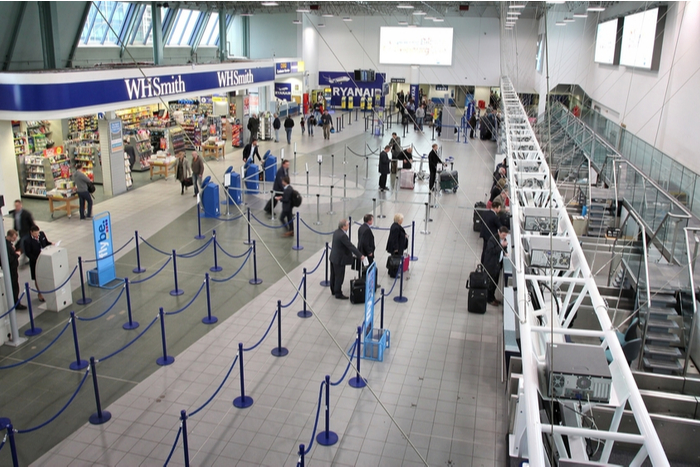Shopping at a travel terminal was once an opportunity for retailers to encourage customers to spend more before their journey. But in more recent times, travel terminals – especially airports – have experienced a rapid decline since the Covid-19 pandemic led to various lockdowns and restrictions.
From mid-March to mid-July last year, Covid-19 triggered a near-total shutdown in international tourism to and from the UK with a few specific exceptions. A ban on travelling for leisure and holidays is still currently in place for the UK, while travelling abroad for work is permitted although subject to quarantine rules.
Non-essential services have been allowed to reopen in England and Wales since April 12 after three months of lockdown. But because travel restrictions are still in place, retailers with shops in travel hubs – such as airports, train stations, coach terminals and others – will still probably witness a drop in sales.
According to Visit Britain, inbound tourism in 2021 is forecast for 11.3 million visits, up 10 per cent on 2020 but only 28 per cent of the 2019 level. In addition, £6.2 billion is to be spent by inbound tourists, up one per cent on 2020 but only 22 per cent of the 2019 level.
The forecast assumes the start of a recovery from May, albeit slow at first, with a step change in the summer followed by gradual recovery throughout the rest of the year as international travel opens up to and from a growing numbers of markets.
Inbound tourism is still likely to remain well below normal levels throughout the rest of the year and by the end of 2021, inbound tourism is not expected to be back to, or even close to, normal levels.
Despite the cynical outlook, a Network Rail spokesperson told Retail Gazette that the railway company is already seeing footfall starting to increase.
“Passenger numbers directly relate to sales at our retailers, so the future is looking positive for the sector,” the spokesperson said.
“Working closely with our retailers, we’ve now reopened 296 units since lockdown began to lift on 12 April – that’s 70 per cent of our portfolio – with more units set to open in the coming weeks.”

Meanwhile, Fred Creighton, UK chief executive at global travel retailer Dufry, said that while it was still unclear how long passenger numbers would take to recover, the company has seen “positive results and feedback” from customers as part of its quarterly surveys which it conducts at 50 airports where it operates.
“This indicates that travel and tourism will resume as soon as travel restrictions, and in particular quarantine regulations, are lifted,” he argued.
“The increasing number of vaccinations worldwide also accelerates this process.”
However, the decline of retail shops in travel destinations is becoming evident – particularly after Dixons Carphone recently made the decision to shutter its airport stores business. The firm said it wouild close down all 35 of its travel shops – a move that places 400 jobs at risk.
The news came just months after a scheme offering duty-free shopping for international tourists was scrapped. In September, the Treasury made a surprise announcement that unveiled plans to end two schemes providing VAT-free shopping for tourists, which were to be withdrawn at the end of the Brexit transition period on New Year’s Day earlier this year.
The Treasury backed up its decision by stating it wanted personal duty and tax systems in line with international norms.
By removing the VAT refund scheme, affected retailers could see a significant drop in profits at their travel and tourist hub locations.
Airport Operators Association chief executive Karen Dee told Retail Gazette that the UK government’s decision to remove airside VAT-free shopping this year was “hampering the financial recovery” from the pandemic for the aviation sector as a whole.
“The UK is now the only country in Europe without airside tax-free shopping,” she said.
“Our European competitors get a Brexit benefit by being able to offer UK-bound travellers every opportunity for tax-free shopping while UK airports are left at a significant disadvantage.
“The government should urgently review this decision and reverse course before further damage is done.”
The Treasury and HMRC’s decision relates to two schemes – the VAT Retail Export Scheme (RES) and an Extra Statutory Concession (ESC) on goods at duty-free and tax-free shops.
The ESC allows VAT-free sales of goods to passengers travelling outside the EU at airports, and the RES covers VAT refunds on landside sales of goods also to non-EU travellers, subject to certain conditions being met.
UK Travel Retail Forum (UKTRF) chairman Francois Bourienne said he continued to “urge the government to reconsider its position to avoid causing further damage to UK businesses and UK livelihoods”.
“When the government took the decision to remove tax free shopping last year, the UKTRF told the Exchequer Secretary that the impact on airside retailers would be profound,” he added.
“Only a few weeks ago, Dixons Carphone announced the closure of all its airport shops up and down the country.
“While we commend Dixon’s commitment to helping their staff find roles elsewhere, there is no escaping the clear negative consequences stemming from a completely avoidable decision by Treasury.
“Airports will not be able to replace this lost revenue immediately and will now find it harder to invest in infrastructure, route development, and the recovery from Covid-19.”

Regarding product categories including beauty, sunglasses, watches, jewellery and souvenirs, which are not duty-free products, Creighton said “Dufry has always offered great value savings and as far as possible, we want to continue to offer the same value”.
“Therefore, the majority of these products will continue to show a 20 per cent saving versus the UK average high street price and we will still offer some of the more popular fragrances at 40 per cent saving versus the UK average high street price,” he told Retail Gazette.
Dixons Carphone said it faced difficulties at Dixons Travel, which comprises 35 stores, including eight at Heathrow and four at Gatwick. It also did not expect passenger numbers to recover sufficiently to compensate for the removal of airside tax-free shopping by the UK government from January 1.
“This has led to the difficult decision to close this business, which historically made an annual profit contribution of over £20 million,” Dixons Carphone said.
Meanwhile, high street retail is undoubtedly on the road to recovery after witnessing an improvement in footfall since reopening.
According to BDO’s High Street Sales Tracker (HSST), consumer confidence was boosted by the easing of lockdown and progress with the Covid-19 vaccination programme across the UK.
Total like-for-like sales, incorporating both in-store and non-store, increased six-fold in April, although this was compared to a weak base of a 29.6 per cent for the same month last year – thanks to the first UK-wide lockdown.
All three retail sectors in BDO’s HSST – fashion, lifestyle and homewares – recorded historic highs, caveated by the drought for sales revenues last year.

Yet one retailer that is adamant on expanding its travel business is WHSmith.
In April, it set out plans to expand its travel division with the opening of 100 new shops despite the losses it suffered during the pandemic. Last week, reports emerged that WHSmith was mulling the possibility of taking over Dixon Carphone’s soon-to-be-closed airport stores as part of a travel recovery gamble.
WHSmith chief executive Carl Cowling said Dixon Carphone’s exit from the travel retail sector was “another opportunity” to roll out InMotion, the US gadget chain it acquired in 2018.
Greg Watts, founder and chief executive of digital marketplace Findr, said travel stores were a “vital” part of the retail estate and although travel is currently seeing a decline in numbers, there is still an appetite for travelling.
“The public will jump at the chance to get away,” he said.
“It is likely that it will take time for passenger numbers to get back to previous volumes. In the meantime, retailers may want to consider scaling back travel operations or looking at how they can improve customer engagement ahead of a trip.
“Buy before you fly and collect at the gate are some great ways to ensure people who are travelling shop with you, rather than your competitors.
“I would suggest looking at partnering with a travel provider who can market your offers and promotions to their customer base before they even leave their house to start their travels.”
Andrew McClellan, chief operations officer at Sim Local said travel retail is undoubtedly a specialist area with highly demanding customers and logistically tough environments.
Given the additional challenges of the last year, it’s not surprising that Dixons Carphone has shuttered its travel estate.
Yet as the UK eases out of lockdowns and more countries are put onto the green list for travel, consumers’ appetite for travel could return, thus providing a key opportunity for retailers to capitalise on the return in demand.
Click here to sign up to Retail Gazette’s free daily email newsletter


















